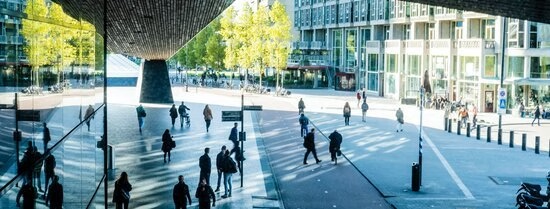Cities can learn a lot from each other. By sharing knowledge, they can collectively find solutions to challenges in sustainability, mobility, economy, and social inclusion. Closer Cities, a non-profit initiative co-founded by Erasmus University Rotterdam, organised a seminar on this topic at the end of May. We spoke with organisers Jurian Edelenbos and Robbert Nesselaar, co-initiator along with Erasmus University, to gain more insight into the importance of knowledge sharing between cities.
Optimally utilizing urban knowledge sounds logical, but the reality is different. Robbert says, "What hinders knowledge sharing? What can encourage it? That's the idea behind Closer Cities: to learn more about harnessing urban knowledge." Jurian adds, "Closer Cities provides insights into how urban professionals can play a role in making knowledge about sustainable urban development shareable. Knowledge and lessons quickly dissipate; they don't jump from city to city, from professional to professional, from person to person. Closer Cities tries to address this by conducting scientific research on knowledge sharing and building networks to stimulate knowledge sharing."
Unanswered Questions
One of the main goals of the seminar was to stimulate better understanding and insight into the sharing and utilization of urban knowledge. "There is already a lot known about effective knowledge sharing and utilization in urban areas," explains Robbert. "But there are still many unanswered questions. With the seminar, we aimed to concretely contribute to the scientific research on urban knowledge exchange optimization."
Jurian adds, "There is much talk and writing about the importance of knowledge sharing, but we still don't know well how to put knowledge into practice, such as innovations. It seems like we reinvent the wheel every time. How long have we heard that participation and co-creation are difficult to get off the ground because there are certain habits and rules that hinder them? We need to know more about the mechanisms that promote or hinder knowledge sharing. It is so important to share experiences and lessons so that we can take steps towards implementing innovations."
Different Perspectives
The seminar had various participants. "Participants included researchers involved in city-to-city learning, knowledge transfer related to smart cities, and researchers working on projects related to river cities," explains Robbert. "This diversity of topics brought different perspectives to the discussion."
Factors Affecting or Promoting Knowledge Sharing
The seminar yielded important insights into knowledge sharing between cities. "We learned that various factors play a role in whether or not knowledge is shared," says Jurian. "For example, we found that the relational quality of collaborations, trust between organisations and individuals, and motivation to share knowledge are essential elements. Additionally, we gained insight into the importance of knowledge brokers who play an active role in facilitating knowledge sharing processes." Robbert concludes, "The next step is to develop actionable perspectives and practical tools based on the framework of factors, which can help urban professionals bring knowledge sharing into practice."
About Closer Cities
The Closer Cities project runs from 2021 to 2030. Visit the website.
- Researcher
- Researcher
- More information
Vital Cities and Citizens
With the Erasmus Initiative Vital Cities and Citizens (VCC) Erasmus University Rotterdam wants to help improve the quality of life in cities. In vital cities, the population can achieve their life goals through education, useful work and participation in public life. The vital city is a platform for creativity and diversity, a safe meeting place for different social groups. The researchers involved focus on one of the four sub-themes:Inclusive Cities and Diversity
Resilient Cities and People
Smart Cities and Communities
Sustainable and Just Cities
VCC is a collaboration between Erasmus School of Social and Behavioural Sciences (ESSB), Erasmus School of History, Culture and Communication (ESHCC) and International Institute of Social Studies (ISS).

